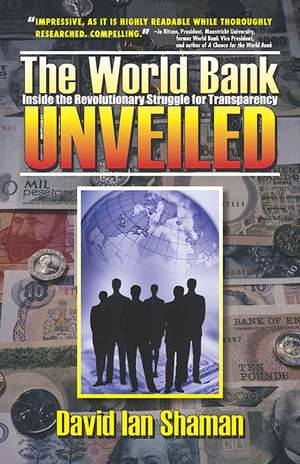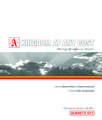The World Bank Unveiled: Inside the revolutionary struggle for transparency: Our National Conversation, cartea 1
Autor David Ian Shamanen Limba Engleză Paperback – 30 sep 2009 – vârsta ani
Nobel Prize winning economist and former World Bank Chief Economist, Joseph Stiglitz, has repeatedly discussed the importance of transparency in policymaking at the World Bank and International Monetary Fund. He believes a lack of transparency in the two institutions has lead to bad decisions. Bad decisions at IMF and the World Bank mean real pain for the world’s poor.
There is a perception that “the suits” close the World Bank’s doors to deliberate the fate of earth’s poorest populations and only when the doors are unlocked do people living in poverty learn what has been decided about their future. Meanwhile donations are down. The bank’s critical International Development Association’s funding has dropped dramatically. Managers are discouraged by studies examining the World Bank’s effectiveness. How, they wonder, could such large beneficences have so little impact on poor populations?
Events of the past two years have only increased the stakes. First, rising fuel prices caused a worldwide rise in the price of basic foods. Then the deepest economic downturn since the Great Depression sapped donor nation’s coffers. By the end of the Bush administration in 2009, giving by the USA lagged more than any other wealthy nation.
In 1999, two Bank researchers understood the situation was already on a precipice. World Bank loans had ceased to make significant impact on poverty in many client nations. Certain governments and multi-national corporations were destroying environments and desecrating indigenous cultures, all to achieve short-term gains for a fortunate few.
Demonstrable successes were few, and every World Bank conference became a melee of demonstrators and police. The two researchers asked themselves whether it was possible to open up the institution by increased transparency, improve its accountability, and mute criticism. They decided to launch an internet-based broadcast to disseminate unedited videos of internal discussions and debates. The bank’s culture and bureaucracy, hardened over a half-century, presented them with a formidable foe. Some powerful officials feared the transparency initiative; others withheld public support while standing on the sidelines. The World Bank Unveiled documents this epic struggle. It is the story of a revolution to transform the World Bank and a case study of the power of the Bank to transform people’s lives.
There is a perception that “the suits” close the World Bank’s doors to deliberate the fate of earth’s poorest populations and only when the doors are unlocked do people living in poverty learn what has been decided about their future. Meanwhile donations are down. The bank’s critical International Development Association’s funding has dropped dramatically. Managers are discouraged by studies examining the World Bank’s effectiveness. How, they wonder, could such large beneficences have so little impact on poor populations?
Events of the past two years have only increased the stakes. First, rising fuel prices caused a worldwide rise in the price of basic foods. Then the deepest economic downturn since the Great Depression sapped donor nation’s coffers. By the end of the Bush administration in 2009, giving by the USA lagged more than any other wealthy nation.
In 1999, two Bank researchers understood the situation was already on a precipice. World Bank loans had ceased to make significant impact on poverty in many client nations. Certain governments and multi-national corporations were destroying environments and desecrating indigenous cultures, all to achieve short-term gains for a fortunate few.
Demonstrable successes were few, and every World Bank conference became a melee of demonstrators and police. The two researchers asked themselves whether it was possible to open up the institution by increased transparency, improve its accountability, and mute criticism. They decided to launch an internet-based broadcast to disseminate unedited videos of internal discussions and debates. The bank’s culture and bureaucracy, hardened over a half-century, presented them with a formidable foe. Some powerful officials feared the transparency initiative; others withheld public support while standing on the sidelines. The World Bank Unveiled documents this epic struggle. It is the story of a revolution to transform the World Bank and a case study of the power of the Bank to transform people’s lives.
Preț: 165.98 lei
Nou
Puncte Express: 249
Preț estimativ în valută:
31.76€ • 33.25$ • 26.28£
31.76€ • 33.25$ • 26.28£
Carte indisponibilă temporar
Doresc să fiu notificat când acest titlu va fi disponibil:
Se trimite...
Preluare comenzi: 021 569.72.76
Specificații
ISBN-13: 9781935166153
ISBN-10: 1935166158
Pagini: 672
Dimensiuni: 152 x 229 x 46 mm
Greutate: 0.84 kg
Ediția:First Edition
Editura: Parkhurst Brothers Publishers Inc
Colecția Parkhurst Brothers Publishers Inc
Seria Our National Conversation
ISBN-10: 1935166158
Pagini: 672
Dimensiuni: 152 x 229 x 46 mm
Greutate: 0.84 kg
Ediția:First Edition
Editura: Parkhurst Brothers Publishers Inc
Colecția Parkhurst Brothers Publishers Inc
Seria Our National Conversation
Notă biografică
David Ian Shaman took his zeal for a better world to work with him at the World Bank, where he was a researcher and became part of a small unit that created B-Span, a web-based telecast project that made unedited bank deliberations available worldwide, often on a same-day basis.
Recenzii
“Impressive, as it is highly readable while thoroughly researched. Compelling.”
"A fascinating and frightening expose of the World Bank's operations. An insider's intimate view of how an organization meant to help the developing world actually hindered progress. A must read!"
“This is an inside story about the World Bank and the challenges it is facing, from outside and within. It is a story about accountability. It is a personal account of an expert, who has tried to bridge the gap between a bureaucracy and the people that should be served. The story is frightening and challenging at the same time. The world needs this Bank. But Bank reform is due. I hope this book is widely read.”
“David Shaman's The World Bank Unveiled offers an unparalleled account of the inner workings of the Knowledge Bank experiment under James Wolfensohn. As the leader of one of the innovative projects - B-SPAN - that were part of attempts to transform the Bank into a more transparent and humble partner for development, Shaman is able to provide a fascinating case study of the way that this vision withered in the face of the powerful existing culture of the Bank. Whilst there have been many books this decade from ex-Bank staff questioning the Bank's role in poverty reduction and development, Shaman's is by far the most significant account of the Knowledge Bank experiment, its potential and its ultimate demise.”
“This is a knock-out of a book. It tells the inside story of how a small group of “guerrilla” staff members, initially working on environmental issues, wheeled and dealed to get the World Bank to accept unedited presentations of its activities both to its own staff and to the wider public. And of how some Bank managers out-machiavellied Machiavelli …”
Descriere
The ongoing global economic crisis threatens one and a half billion people who live in poverty. An effective World Bank is critical to reducing global poverty, but can it effectively tackle the challenge? In the first half of the 2000’s, two Bank researchers sought to increase transparency and accountability within an institution mired in bureaucracy and secrecy. What unfolds is a dramatic story of how the World Bank really operates, the power it has to change people’s lives and how it can be successful in the current crisis.






